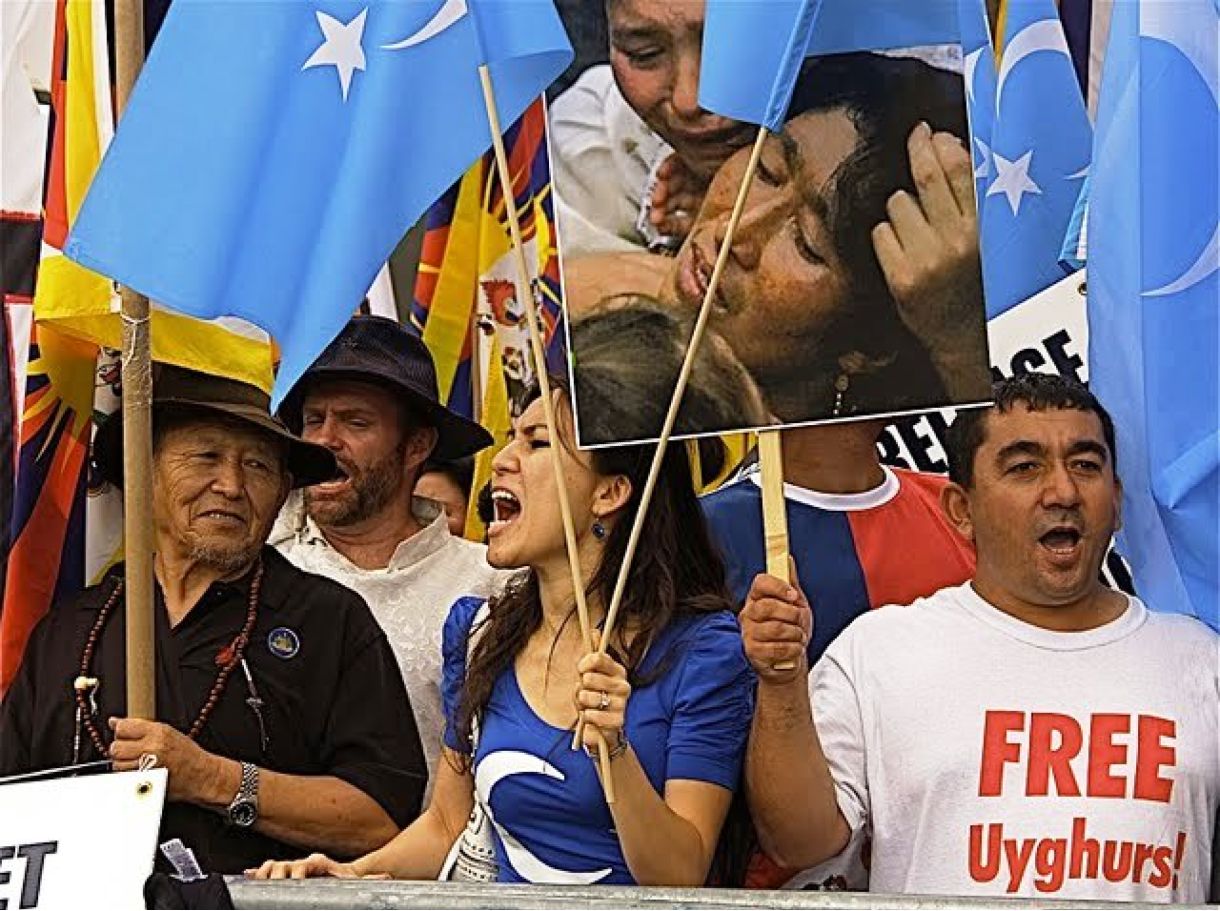On August 30, UN High Commissioner of Human Rights, Michelle Bachelet, released the official report covering the period when Chinese authorities arbitrarily detained up to 1.8 million Uyghurs and other Turkic minorities in internment camps in Xinjiang.
Numerous investigative reports by rights groups, researchers, foreign media, and think tanks supplemented the findings by the High Commissioner.
The report says that “serious human rights violations have been committed in the Xinjiang Uyghur Autonomous Region (XUAR) in the context of the Chinese government’s application of counter-terrorism and counter- “extremism” strategies.”
The 46-page report goes on to say that the human rights violations documented in the Office of the High Commissioner for Human Rights (OHCHR) assessment flow from “a domestic ‘anti-terrorism law system’ that is deeply problematic from the perspective of international human rights norms and standards.”
Uyghur Diaspora in Washington Protests
The point to note is that while China is ruthlessly implementing a domestic anti-terrorism law system to suppress the alleged “local terrorists,” she uses veto power at the Security Council sessions to shield the designated terrorists in a neighboring country from being taken on under the established law.
This is not only the blatant misuse of veto power by China not once but several times, but it also brings to light that even an institution like SC is politicized and trivialized.
Many member countries of the UN, who have been clamoring for drastic reforms in the objectives and structure of the UN, are very right in lodging a subdued protest. Their warnings need to be taken in good stead.
Surprisingly, while the report states that the “Vocational Education and Training Centres” — the Chinese nomenclature for incarceration camps for Uyghurs — have been wound up, the repressive measures are not halted, and — “there appears to be a parallel trend of an increased number and length of imprisonments occurring through criminal justice processes, suggesting that the focus of deprivation of liberty detentions has shifted towards imprisonment, on purported grounds of counter-terrorism and counter-extremism.”
And then follows the unambiguous verdict of the Commissioner, which, by implication, invites a follow-up action.

It is for the reason of no action or deferred action that the strong Uyghur Diaspora in Washington staged a protest rally.
22 Uyghurs Die Of Medical Negligence
In a broadcast on September 21, Radio Free Asia, after confirming with the police and the bereaved family members, reported that at least 22 people died of starvation or lack of medical attention on a single day last week under China’s COVID lockdown policies in the northern Xinjiang city of Ghulja.
Appeals for help from Uyghurs trapped in quarantine under Beijing’s zero-COVID measures are popping up on Chinese social media platforms. Their suffering, highlighted by the agitating Uyghur Diaspora, calls for international action against China’s heavy-handed assimilation campaign for the minorities in the Xinjiang Uyghur Autonomous Region (XUAR).
The protest against assimilation by other minorities like the Kazakh and the Tibetans have also been reported from time to time which lends credibility to the protestation and complaints of the Uyghurs of Xinjiang.
Uyghurs in the city have also complained that their residential management offices charge exorbitant fees to deliver food donated outside the area. Uyghurs from outside Ghulja say housing managers have refused to accept donated food.
According to a video shared on the Chinese platform Duoyin, one of the deaths on September 15 was of Halmutar Ömerjan, the chairman of Kepekyuzi village in Ghulja.
The Chinese response to the report of the UN High Commissioner is a classic example of divergence of word from the deed. It says, “This so-called ‘assessment’ runs counter to the mandate of the OHCHR and ignores the human rights achievements made together by people of all ethnic groups in Xinjiang and the devastating damage caused by terrorism and extremism to the human rights of people of all ethnic groups in Xinjiang.”
The inference is that China understands that “terrorism and extremism cause devastating damage to the human rights of people of all ethnic groups.” If this is China’s conviction, why then does she stand up to defend before the Security Council the state-sponsored terrorists of Pakistan whose attacks in Mumbai, Delhi, Pathankot, and Pulwama have taken
the lives of hundreds of innocent people?
“Based on the disinformation and lies fabricated by anti-China forces and out of the presumption of guilt, the so-called “assessment” distorts China’s laws and policies, wantonly smears and slanders China, and interferes in China’s internal affairs, which violates principles including dialogue and cooperation, and non-politicization in the field of human rights, and also undermines the credibility of the OHCHR,” the statement further said.
In light of this assertion of the Chinese envoy in Geneva, one may ask who politicizes human rights and who undermines the credibility of the OHCHR. China stands to support Pakistan’s state-sponsored terrorism just because she uses them in defense of her atrocities on the minorities — the Uyghurs, Kazakhs, Tibetans, and others of Turkic ethnic origin.
China Tried Preventing The Report’s Release
In response to the report’s release, Sophie Richardson, China director at New York-based Human Rights Watch, said Bachelet’s “damning findings explain why the Chinese government fought tooth and nail to prevent the publication of her Xinjiang report, which lays bare China’s sweeping rights abuses.”
Speaking in an interview with RFA Uyghur, Richardson said that Bachelet’s report is “not the report Xi Jinping wanted a month before the 20th Party Congress, when the CCP leader will seek an unprecedented third term in office, following constitutional amendments in March 2018, removing presidential term limits.”
In June, nearly 50 UN member states issued a statement criticizing China’s atrocities against Uyghurs and called Bachelet to release the Xinjiang report.
Amusingly, a letter written by China expressing “grave concern” about the Xinjiang report was circulated among diplomatic missions, asking other countries to sign it to show their support for China’s goal of convincing Bachelet to halt its release, Reuters reported in July from Geneva.
In a statement, US Secretary of State Antony Blinken welcomed the report, saying, “This report deepens and reaffirms our grave concern regarding the ongoing genocide and crimes against humanity that PRC government authorities are perpetrating against Uyghurs, who are predominantly Muslim, and members of other ethnic and religious minority groups in Xinjiang.”
The US would work closely with its partners, civil society, and the international community to seek justice and accountability for Uyghur victims and continue to hold China to account, Blinken added.
The then UK Foreign Secretary Liz Truss said the report provided new evidence of “the appalling extent of China’s efforts to silence and repress Uyghurs and other minorities in Xinjiang.” Japan and Germany both expressed their concern about the human rights abuse in Xinxiang.
In the three weeks since Bachelet issued the report, the UN rights experts and Uyghur groups have stepped up calls for concrete action from the international community, including setting up a UN Human Rights Council panel and a special envoy on Xinjiang abuses and steps by member states and businesses to hold China accountable.
Remarks on Xinjiang by Biden and by German Chancellor Olaf Sholtz were welcome, “but certainly not enough to stop the ongoing genocide,” said World Uyghur Congress President Dolkun Isa.
“We ask the UN member states to activate the UN mechanism to investigate the genocide and the US-led free world to call for the passage of a UN resolution to condemn China’s ongoing genocide,” he demanded.
- Padma Shri KN Pandita is the former Director of the Centre of Central Asian Studies at Kashmir University. Views expressed here are of the author’s.
- Mail EurAsian Times at etdesk(at)eurasiantimes.com
- Follow EurAsian Times on Google News




